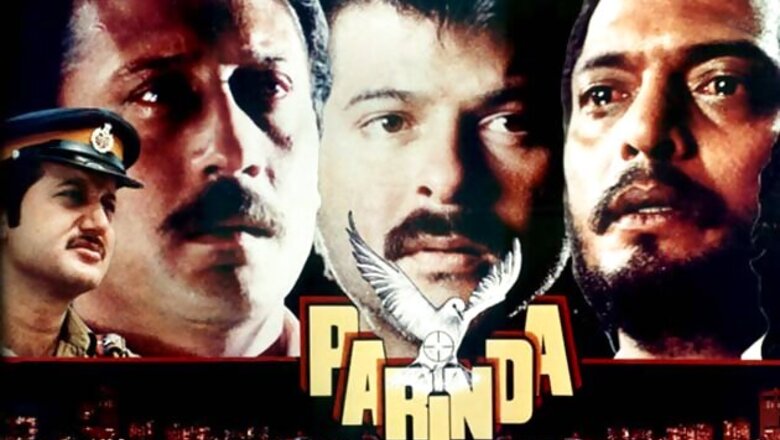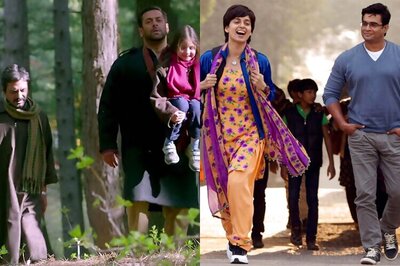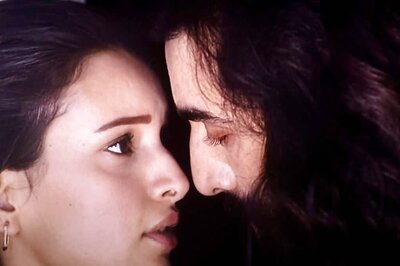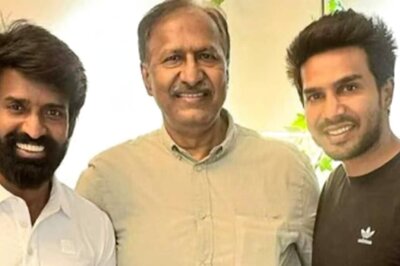
views
Dadasaheb Phalke's silent Marathi feature film Raja Harishchandra premiered in May, 1913. The countdown to 100 years of Indian cinema begins this year. As part of our celebrations, we start with a series of retro reviews of some of the timeless classics. How would you rate films such as Saheb Biwi Aur Ghulam, Pakeezah or Sholay if you saw them today? We hope to revive the familiar nostalgia and fondness for good cinema with these flashback retrospection reviews. We thought Vidhu Vinod Chopra's Parinda would set the tone since the director-producer completed 30 years in the industry in 2012.
Chopra started his journey in filmdom with short films like 'Murder At Monkey Hill' and 'Encounter with Faces'. His first feature film, shot in black-and-white was 'Sazaa-E-Maut' (1981). He is best known for films like 'Parinda', '1942: A Love Story', 'Mission Kashmir', 'Munna Bhai' series, 'Parineeta' and 'Three Idiots'.
Cast: Jackie Shroff, Anil Kapoor, Nana Patekar, Anupam Kher, Madhuri Dixit
Director: Vidhu Vinod Chopra
What meaning does the word 'Bombay underworld' hold?
Probably it's a place that we have seen in 'Deewar' or recently in 'Tezaab'. But, here is a film that has the potential to change all your pre-conceived notions about the so called 'Bombay underworld'. Vidhu Vinod Chopra's 'Parinda' is emotional, dark, satirical and scary, all at the same time. It's the insight into the world of crime where the character’s inside terror is more dreaded than the visible terror.
Kishen (Jackie Shroff) works for an underworld don Anna (Nana Patekar) but he wants to keep his brother Karan (Anil Kapoor) away from the world of crime. Actually both the brothers had come to Bombay in their childhood but one of them was forced to take up crime as occupation. Kishen wants Karan to go for higher studies but things get complicated once Karan returns to India. Karan's best friend and his love interest Paro's (Madhuri Dixit) brother Prakash (Anupam Kher) gets killed in front of his eyes but Kishen warns him to not get involved in any clashes with the underworld.
Very soon Karan knows that his own brother works for the underworld and now he decides to come face to face with Anna, the man behind Prakash's murder.
However, the situation doesn't favour the brothers and finally Kishen convinces Karan to leave the city. Anna doesn't believe in letting the enemy go and thus he kills Karan and Paro on their wedding night. Now, Kishen turns against Anna.
The screenplay of the film follows a classic structure where all the primary characters are introduced in the beginning only. Back stories have been given to give the audiences a clear cut character sketch. Anna's back story forms the back bone of the narration. Some characters are introduced to carry the story forward but they don't come across as irrelevant snippets. Be it the beggar Iqbal's character or be it Musa’a role, each character contributes to the story in its own way.
The moral struggle to stand up against your own profession is depicted with precision. One of the powerful moments of 'Parinda' takes place when Kishen tries his best to convince Karan to not go against Anna.
The semi-climax is definitely worth watching when Karan and Paro are murdered on their wedding night. We generally don't see such effective use of parallel cutting in Hindi films.
Acting wise, 'Parinda' belongs to Nana Patekar and Jackie Shroff. Nana as a cynical don has shown the vulnerability of the human mind with ease. He is believable and frightening.
Jackie excels in the climax, right at the time when he was needed to do so. The climax also demonstrates Vidhu Vinod's control over the film. He keeps the undercurrent of terror flowing throughout the film and releases is with full force in the end, that too via actions not dialogue.
The film has some striking metaphors like the use of the song 'Hum honge kamyaab' and the flying birds which go down well with the spectators.
Binod Pradhan's cinematography keeps itself away from the shining side of Bombay and doesn't hesitate in venturing through the muddy, crowded streets. Lighting done in Karan's murder scene is breathtaking.
The editor has done a satisfactory job but some of the scenes seem dragged. For example the conversation between the brothers when Karan returns from America consumes a little more than required time.
The film is not a musical but one song 'Tumse milke' is the pick of the lot. It is melodious and gels well with the story.
'Parinda' is definitely preachy at times but its final message makes it worth watching. Parinda's success lies in the fact that it eventually deglamourizes the underworld. It's a film made with a subtle understanding of the Bombay underworld and the audience will remember it as a different and new take on the world of crime.
'Parinda' deserves 3 out of 5.




















Comments
0 comment